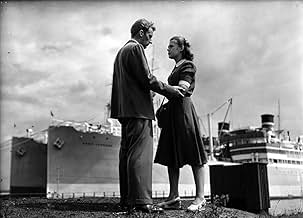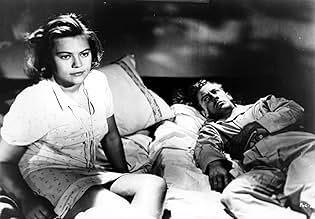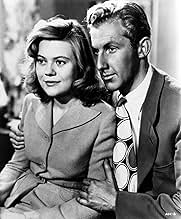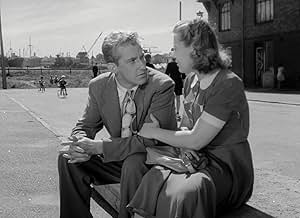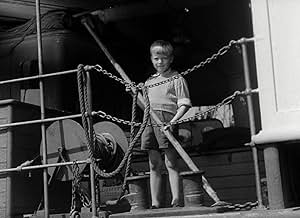A suicidal factory girl out of reformatory school, anxious to escape her overbearing mother, falls in love with a sailor who can't forgive her past.A suicidal factory girl out of reformatory school, anxious to escape her overbearing mother, falls in love with a sailor who can't forgive her past.A suicidal factory girl out of reformatory school, anxious to escape her overbearing mother, falls in love with a sailor who can't forgive her past.
Edvard Danielsson
- Klockaren
- (scenes deleted)
Carl Deurell
- Prästen
- (scenes deleted)
Kolbjörn Knudsen
- En sjöman
- (scenes deleted)
Gunnar Nielsen
- En herre (1)
- (scenes deleted)
Featured reviews
The sailor Gösta Andersson (Bengt Eklund) quits sailing in Gothenburg and while walking in the harbor, he rescues the worker Berit Irene Holms (Nine-Christine Jönsson) that has just jumped into the sea attempting to commit suicide. Then he meets his friends and finds a job of dockworker with them. A couple of days later, Gösta and Berit meet each other by chance in a ball and they have sex at her house. Gösta dates the needy Berit that falls in love with him and decides to tell her past in a reformatory school and her former relationships to him. But the twenty-nine year old man is not ready to forget the past of Berit and forgive her.
"Hamnstad" is the fifth Bergman's film with a bitter and bleak love story of a needy and lonely girl raised in a dysfunctional family with a domineering mother that is sent to a reformatory school, and her boyfriend that likes her, but can not forgive her past. This is the typical anti-Hollywood love story, with themes that seems to be ahead of time (for a 1948 film), such as abortion and one night stand between the couple that has just met each other. My vote is eight.
Title (Brazil): "Porto" ("Seaport")
"Hamnstad" is the fifth Bergman's film with a bitter and bleak love story of a needy and lonely girl raised in a dysfunctional family with a domineering mother that is sent to a reformatory school, and her boyfriend that likes her, but can not forgive her past. This is the typical anti-Hollywood love story, with themes that seems to be ahead of time (for a 1948 film), such as abortion and one night stand between the couple that has just met each other. My vote is eight.
Title (Brazil): "Porto" ("Seaport")
For viewers born decades after the end of the second worldwide conflict, it's hard to imagine anything but joy and optimism in the hearts of the younger population that went through what was probably the hardest (and certainly darkest) part of their lives. We've all basked in stories, real and fictional, that knighted those who fathered the baby-boomers with the title of the greatest generation, one whose youth was sacrificed at history's altar ... but that's overlooking their ordinariness, how modest their aims were and thus how poignantly relatable their lives could be outside the epic scope of war and other life-and-death situations.
When Ingmar Bergman "Port of Call" starts, war is way over and there's no any indication of life-threatening situations yet the film opens with a startling suicide attempt: a girl takes a big dive from a dock and many people come to rescue her, including a war veteran who just settled in the port town. From what it looks like, the two protagonists didn't benefit from the kind of existential canvases that invite for optimism: the man is a sailor back from war, disillusioned and hiding his easy-going nature behind a mask of cynicism, his name is Gösta (Bengt Eklund), the woman is a young factory girl, depressed and insecure, with the kind of troubled past that makes any romance doomed from the start, and whose roots are to be found within a tense relationship with her overbearing mother. She's Berit (Nine-Chrstine Jönsson).
Those were the neo-realism days in Europe and the noir era in the U.S.A, the film, maybe unconsciously driven by these two influences, doesn't intend to paint a glamorous romance of any kind but rather a life capsule in a small seaside working-class town, a sort of Swedish "On the Waterfront" where we follow the lives of two loners as they converged one night at a dance. It's an immediate and mutual appreciation that never feels forced nor contrived, it IS believable that the two would find oasis of serenity within each other. To use fitting metaphors, Gösta has nothing but dreams of stability, he's a boat that wants to set ashore someplace, drop the anchor once and for all, he just doesn't have a compass, Berit on the other hand is a raft drifting in the ocean of her own guilt-ridden past and has no rows whatsoever to move on.
In a way the film is more about Berit's attempt to come to term with that past of hers, it's not much a character study but a psychological journey into a mindset that made happiness as improbable as the sight of land for a boat without any guidance. Gösta is an active and passive observer who acts as a lookout sometimes and some others becomes a true rower on Berit's frail embarkation. He knows she's as tormented as he is, he doesn't care much about her past though he's clearly displeased by the constant harassment she gets from men, raising suspicions of the ugliest sorts. So, as the film moves on and their relationship thickens, more obstacles come across their journey to the promised harbor, divulgated through flashbacks, revealed secrets and a subplot involving Berit's friend Gertrud, Bibi Nelson.
The flashbacks on Berit's life are depressing and bleak: marital fights, scandals, life in reformatory school that borders on prostitution and debauchery, a difficult mother-and-daughter relationship, it's a cocktail of lurid negativity that darkens an already heavy-loaded movie and the irony is that the friend Gertrud got an even worse deal. The contrast between Berit and Gertrud is interesting on two levels: it highlights the fact that Berit is abler to fight her own demons and maybe her real tragedy is that she can't handle happiness even when served on a silver platter, as if it was a dish best served cold. The second level is that the film is a powerful social commentary on the tormented lives of women with a 'bad rep' in a system that often pose as a judge of morality, driving them to the most extreme and sometimes macabre corners.
Bergman, in one of his breakthrough movies, displays the kind of sensitivities that made he glorious days of European neo-realism, his "Port of Call" is as powerful and introspective as the Italian classics of the late 1940s through this portrayal of two lost souls who come to find a true meaning to their lives after many years of unhappiness and resentment. For that, the director shows a predisposition for lengthy intimate scenes where two faces are close to each other and one speak alone without looking at the other, as if the act of talking was individual and solitary in essence. But when Berit confesses her past to Gösta, it looks like she's talking to us; from either point of view, ours or Gösta's, you can feel the emergence of a cinematic talent and a unique ability to paint human emotions with consideration to the viewers.
The film is rather simple but it's made in such a way we feel like belonging to the screen... and that's Bergman's power, every once in a while, "Port of Call" ceases to be that gripping drama and reaches an unexpected summit of film-making showing the early signs of the genius, small moments where souls are confronted one to another, talking, deciding and acting. The tension is real and makes the few moments of relief only more rewarding. And that's an adjective I'd use to describe the ending, one that such a movie called for, after so many questioning about life, it was only fair that the two young protagonists, directed under a then-young director could find one reason to two to see the future in brighter colors, almost spoiled by the poster.
When Ingmar Bergman "Port of Call" starts, war is way over and there's no any indication of life-threatening situations yet the film opens with a startling suicide attempt: a girl takes a big dive from a dock and many people come to rescue her, including a war veteran who just settled in the port town. From what it looks like, the two protagonists didn't benefit from the kind of existential canvases that invite for optimism: the man is a sailor back from war, disillusioned and hiding his easy-going nature behind a mask of cynicism, his name is Gösta (Bengt Eklund), the woman is a young factory girl, depressed and insecure, with the kind of troubled past that makes any romance doomed from the start, and whose roots are to be found within a tense relationship with her overbearing mother. She's Berit (Nine-Chrstine Jönsson).
Those were the neo-realism days in Europe and the noir era in the U.S.A, the film, maybe unconsciously driven by these two influences, doesn't intend to paint a glamorous romance of any kind but rather a life capsule in a small seaside working-class town, a sort of Swedish "On the Waterfront" where we follow the lives of two loners as they converged one night at a dance. It's an immediate and mutual appreciation that never feels forced nor contrived, it IS believable that the two would find oasis of serenity within each other. To use fitting metaphors, Gösta has nothing but dreams of stability, he's a boat that wants to set ashore someplace, drop the anchor once and for all, he just doesn't have a compass, Berit on the other hand is a raft drifting in the ocean of her own guilt-ridden past and has no rows whatsoever to move on.
In a way the film is more about Berit's attempt to come to term with that past of hers, it's not much a character study but a psychological journey into a mindset that made happiness as improbable as the sight of land for a boat without any guidance. Gösta is an active and passive observer who acts as a lookout sometimes and some others becomes a true rower on Berit's frail embarkation. He knows she's as tormented as he is, he doesn't care much about her past though he's clearly displeased by the constant harassment she gets from men, raising suspicions of the ugliest sorts. So, as the film moves on and their relationship thickens, more obstacles come across their journey to the promised harbor, divulgated through flashbacks, revealed secrets and a subplot involving Berit's friend Gertrud, Bibi Nelson.
The flashbacks on Berit's life are depressing and bleak: marital fights, scandals, life in reformatory school that borders on prostitution and debauchery, a difficult mother-and-daughter relationship, it's a cocktail of lurid negativity that darkens an already heavy-loaded movie and the irony is that the friend Gertrud got an even worse deal. The contrast between Berit and Gertrud is interesting on two levels: it highlights the fact that Berit is abler to fight her own demons and maybe her real tragedy is that she can't handle happiness even when served on a silver platter, as if it was a dish best served cold. The second level is that the film is a powerful social commentary on the tormented lives of women with a 'bad rep' in a system that often pose as a judge of morality, driving them to the most extreme and sometimes macabre corners.
Bergman, in one of his breakthrough movies, displays the kind of sensitivities that made he glorious days of European neo-realism, his "Port of Call" is as powerful and introspective as the Italian classics of the late 1940s through this portrayal of two lost souls who come to find a true meaning to their lives after many years of unhappiness and resentment. For that, the director shows a predisposition for lengthy intimate scenes where two faces are close to each other and one speak alone without looking at the other, as if the act of talking was individual and solitary in essence. But when Berit confesses her past to Gösta, it looks like she's talking to us; from either point of view, ours or Gösta's, you can feel the emergence of a cinematic talent and a unique ability to paint human emotions with consideration to the viewers.
The film is rather simple but it's made in such a way we feel like belonging to the screen... and that's Bergman's power, every once in a while, "Port of Call" ceases to be that gripping drama and reaches an unexpected summit of film-making showing the early signs of the genius, small moments where souls are confronted one to another, talking, deciding and acting. The tension is real and makes the few moments of relief only more rewarding. And that's an adjective I'd use to describe the ending, one that such a movie called for, after so many questioning about life, it was only fair that the two young protagonists, directed under a then-young director could find one reason to two to see the future in brighter colors, almost spoiled by the poster.
A young man gets off a boat in a harbor. Moments later, he witnesses a young woman jump off the harbor into the water in obvious despair. They don't meet, but he just watches as someone closer jumps into the water and fishes her out, leaving the young woman crying on the pavement.
Thus starts Port of Call, a movie that touches on a few familiar themes that Bergman would visit in his later movies and, for a time, gets very closer to be a special gem in his early filmography. Missteps in the film's second half, though, hamper the film and keep it from being quite good.
The two young people meet at a night club some time later and immediately hit it off, but we can see that the woman, Berit, is beset by some emotional problems while the young man, Gosta, seems, perhaps, a little too aloof for something like a serious relationship. However, they enjoy each other's company, work through some early misunderstandings and a confrontation with a handsy foreman Berit works under that leaves Gosta bloody, and eventually decide to spend a weekend alone together. They are not married, so they pretend the relationship in order to get a room, but Berit is confronted by a figure from her past.
Berit lived in a very unhappy home growing up. Her parents hated each other, but they remained together (whenever her father wasn't at sea as a ship's first mate) in order to try and give Berit a stable home. That didn't really work and Berit ended up running away to live with a boy she hardly knew. Despite the match being remarkably happy, Berit was still underage, found, and sent to a reform house where she met Gertrude, a fellow delinquent. The two developed a common bond, if not a particular friendship, over their shared experience, and Gertrude's presence at the hotel where she works and the couple are staying, brings everything back. Berit decides to unload herself to Gosta whom she hopes will be understanding.
Gosta can't quite reconcile his feelings for Berit with her past, asking her how many men she had been with. Her looseness, of a certain variety, bothers him. The scene of the reveal is a bit awkward. On the one hand, there's a wonderful element of later Bergman as the camera focuses squarely on Berit with Gorsta in the background taking in the information. On the other hand, the film goes into a series of flashbacks that don't work that well, especially the last one that details the scene where Berit lived with another boy and his parents as the parents kicked her out. The reasons for the action we see are unclear, short, and involve three characters we've never seen before. The overall confessional would have been more effective with just Berit talking (a technique Bergman would later use much more frequently).
The scene that touches rather directly on later thematic chords from Bergman involves Gosta telling his female troubles to fellow dockworkers. One of them ends up telling him that no one else cares about the problems and only Gorsta and Birta do. This presages the silent God of Bergman's middle period, and the laser focus on relationships and those directly involved in his later period. However, the movie gets bogged down with competing ideas that get pushed on in front of another. It's not a complete failure, but it's enough of a distraction to take what had been a very promising film into something far more ordinary. Even Gertrude's death after a botched abortion feels a bit more like a distraction instead of something that feeds the central narrative.
Still, the movie shows Bergman's early promise. Performances are universally good, and the visual keys he would later use are strong as he alternates between real locations in Stockholm (similar to how he would use Faro later) to more stylized sets (evoking his later use of sets for certain films like All These Women). It's almost good, but not quite.
Thus starts Port of Call, a movie that touches on a few familiar themes that Bergman would visit in his later movies and, for a time, gets very closer to be a special gem in his early filmography. Missteps in the film's second half, though, hamper the film and keep it from being quite good.
The two young people meet at a night club some time later and immediately hit it off, but we can see that the woman, Berit, is beset by some emotional problems while the young man, Gosta, seems, perhaps, a little too aloof for something like a serious relationship. However, they enjoy each other's company, work through some early misunderstandings and a confrontation with a handsy foreman Berit works under that leaves Gosta bloody, and eventually decide to spend a weekend alone together. They are not married, so they pretend the relationship in order to get a room, but Berit is confronted by a figure from her past.
Berit lived in a very unhappy home growing up. Her parents hated each other, but they remained together (whenever her father wasn't at sea as a ship's first mate) in order to try and give Berit a stable home. That didn't really work and Berit ended up running away to live with a boy she hardly knew. Despite the match being remarkably happy, Berit was still underage, found, and sent to a reform house where she met Gertrude, a fellow delinquent. The two developed a common bond, if not a particular friendship, over their shared experience, and Gertrude's presence at the hotel where she works and the couple are staying, brings everything back. Berit decides to unload herself to Gosta whom she hopes will be understanding.
Gosta can't quite reconcile his feelings for Berit with her past, asking her how many men she had been with. Her looseness, of a certain variety, bothers him. The scene of the reveal is a bit awkward. On the one hand, there's a wonderful element of later Bergman as the camera focuses squarely on Berit with Gorsta in the background taking in the information. On the other hand, the film goes into a series of flashbacks that don't work that well, especially the last one that details the scene where Berit lived with another boy and his parents as the parents kicked her out. The reasons for the action we see are unclear, short, and involve three characters we've never seen before. The overall confessional would have been more effective with just Berit talking (a technique Bergman would later use much more frequently).
The scene that touches rather directly on later thematic chords from Bergman involves Gosta telling his female troubles to fellow dockworkers. One of them ends up telling him that no one else cares about the problems and only Gorsta and Birta do. This presages the silent God of Bergman's middle period, and the laser focus on relationships and those directly involved in his later period. However, the movie gets bogged down with competing ideas that get pushed on in front of another. It's not a complete failure, but it's enough of a distraction to take what had been a very promising film into something far more ordinary. Even Gertrude's death after a botched abortion feels a bit more like a distraction instead of something that feeds the central narrative.
Still, the movie shows Bergman's early promise. Performances are universally good, and the visual keys he would later use are strong as he alternates between real locations in Stockholm (similar to how he would use Faro later) to more stylized sets (evoking his later use of sets for certain films like All These Women). It's almost good, but not quite.
While Gosta, a seaman, arrives in Gothenburg, a young girl, Berit, makes a suicide attempt in the city harbour. After saving her, a rather promising relationship seems to begin but much work needs to be done from both of them in order to be together.
In 1948, Ingmar Bergman seems already familiar with the themes that he will never stop examining throughout his career. He observes and studies human behavior in everyday circumstances, in an effort to get a glimpse of its roots. Berit is depressed, but her situation has a long story, starting from her childhood. Growing up with a mother that never cared for anything and anyone but herself and a father that had a problem hiding his temper, she ended up in a reform school and the implications are therefore predictable. Gosta has just finished working in the ships and he finds himself working in the docks of Gothenburg, despite his ambition for something bigger. They are both in the need of a clean start in their lives, carrying their burdens from the past on the left and their dreams for the future on the right.
When they first meet, they can't possibly imagine how similar they are. In fact, they seem incapable of realizing anything because of the wall they have built around them in order to protect themselves. But she desperately needs to free herself from her mother (who impersonates all of her past) and he desperately needs to find someone to relief him from his loneliness. So, they will fight through all the difficulties for these goals. Eventually, she will learn to have some faith in other people, he will learn to forgive and they will both learn to face the past.
This film also works on a political level as the story takes place among the dock workers struggling everyday just for the essentials. Bergman himself admits the influence that the Italian Neo-Realists had on him in his first films and Port of Call is a characteristic example. It is mostly shot on location and the work in cinematography is really admirable, the black and white photography and the camera movement is stunning and Bergman proves how talented he is when it comes to framing. The leading actors give notable performances, especially Nine-Christine Jonsson.
Overall, Port of Call is an interesting film, a typical example of the first period in Bergman's filmography that will reach its climax with "Summer with Monika". The story may sound clichéd and naïve at times, but it is its honesty that engages its viewers, as well as the masterful shots of the great Swedish director.
In 1948, Ingmar Bergman seems already familiar with the themes that he will never stop examining throughout his career. He observes and studies human behavior in everyday circumstances, in an effort to get a glimpse of its roots. Berit is depressed, but her situation has a long story, starting from her childhood. Growing up with a mother that never cared for anything and anyone but herself and a father that had a problem hiding his temper, she ended up in a reform school and the implications are therefore predictable. Gosta has just finished working in the ships and he finds himself working in the docks of Gothenburg, despite his ambition for something bigger. They are both in the need of a clean start in their lives, carrying their burdens from the past on the left and their dreams for the future on the right.
When they first meet, they can't possibly imagine how similar they are. In fact, they seem incapable of realizing anything because of the wall they have built around them in order to protect themselves. But she desperately needs to free herself from her mother (who impersonates all of her past) and he desperately needs to find someone to relief him from his loneliness. So, they will fight through all the difficulties for these goals. Eventually, she will learn to have some faith in other people, he will learn to forgive and they will both learn to face the past.
This film also works on a political level as the story takes place among the dock workers struggling everyday just for the essentials. Bergman himself admits the influence that the Italian Neo-Realists had on him in his first films and Port of Call is a characteristic example. It is mostly shot on location and the work in cinematography is really admirable, the black and white photography and the camera movement is stunning and Bergman proves how talented he is when it comes to framing. The leading actors give notable performances, especially Nine-Christine Jonsson.
Overall, Port of Call is an interesting film, a typical example of the first period in Bergman's filmography that will reach its climax with "Summer with Monika". The story may sound clichéd and naïve at times, but it is its honesty that engages its viewers, as well as the masterful shots of the great Swedish director.
6sol-
An early film from Ingmar Bergman, it is just as interesting on a visual scope as his films usually are, with the docklands filmed well and good use of panning and dolly work throughout. In terms of story and acting though, this is rather ordinary stuff, despite some interesting ideas and philosophies about freedom. It seems the easy way to out to just classify this film as interesting but not up to the standard that Bergman would later set, however I cannot think of much else to say here. It certainly is not as thought-provoking and intense as some of his later films, and for those not interested in Bergman or clever camera movement, I could easily imagine this piece coming across as boring.
Did you know
- TriviaThe book which Gösta reads on his bed is 'Resor utan mål' ('Journeys Without Destination') by Swedish author and future Nobel laureate in Literature (1974) Harry Martinson. Martinson was, indeed, a sailor before becoming an author, and the book, published in 1932 as Martinson's first prose volume (his greatest fame would come for his poetry), was a document of his own experiences as one, written at twenty-eight after he had given up the sea due to a combination of lack of employment and a bout of tuberculosis. A sailor like Gösta would indeed have found much interest in the book, as it dealt realistically with the life of a sailor from his country living a life very similar to his own. The book itself has sadly never been published in English, but Martinson's second novel, 'Kap Farväl!', somewhat similar to 'Resor utan mål', was translated as 'Cape Farewell'. Director Ingmar Bergman was indeed an admirer of his countryman Martinson and, in 1964, he staged the premiere of Martinson's play 'Tre knivar från Wei' ('Three Knives From Wei'), although, unfortunately, he considered the production an unmitigated disaster.
- GoofsWhen the camera pans from Gösta to Skåningen in the whistling scene, an object which is probably a microphone can be seen briefly in the upper right frame.
- Quotes
Gertrud's Father: She never gave me any joy. Perhaps it's turned out for the best.
- ConnectionsFeatures Stackars lilla Sven (1947)
- SoundtracksLa paloma
("A Dove")
Composed by Sebastian Iradier (1859)
Swedish text by Ernst Wallmark
Performed by Bengt Eklund
- How long is Port of Call?Powered by Alexa
Details
- Runtime
- 1h 40m(100 min)
- Color
- Sound mix
- Aspect ratio
- 1.37 : 1
Contribute to this page
Suggest an edit or add missing content

